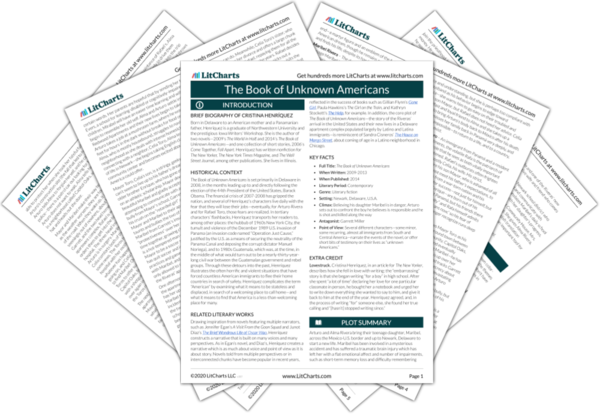The Unknown and The American Dream
The American Dream—the idea that in America everyone, regardless of race, creed, or class, can enjoy prosperity, liberty, and the pursuit of happiness—is a driving force in the lives of the characters in Cristina Henríquez’s The Book of Unknown Americans. The pursuit of the American dream offers, in theory, the chance not just to be safe and sheltered in the United States, but also to be seen, known, and accepted. However, as Henríquez’s characters—almost all…
read analysis of The Unknown and The American DreamLonging
The hope that “someplace else will be better” and the desire to reach that bettered state of living drives each and every character in The Book of Unknown Americans. Though all of the characters take steps to reach a better life, in the end everyone still longs for something more. By finishing her novel on this note, Cristina Henríquez makes the argument that longing is a living, breathing thing—it is never satisfied and it…
read analysis of LongingIsolation vs. Community
Henriquez’s characters are all struggling with loneliness and isolation that are, in many cases, born out of a profound sense of dislodgement and statelessness. The Riveras—the newest arrivals to the bustling apartment complex which houses the “unknown Americans” of Henríquez’s novel—are the most affected by this, especially at the beginning of the novel. As the Riveras begin to make sense of their new lives in Delaware, though, they become a part of the community of…
read analysis of Isolation vs. Community
Futility, Chance, and Loss
Throughout The Book of Unknown Americans, Cristina Henríquez continually forces her characters to reckon with losses small and large, and to consider the futility of their actions in trying to prevent, combat, or soothe those losses. The Riveras work hard to obtain visas to come to the States legally, give up everything they know in leaving Mexico, and struggle daily in their new lives in America only to have their dreams crushed, their legal…
read analysis of Futility, Chance, and Loss






